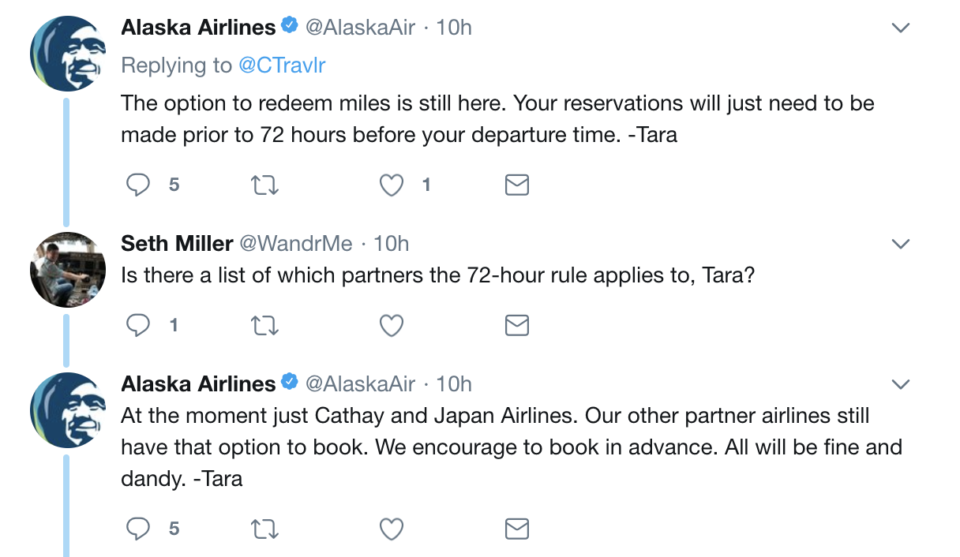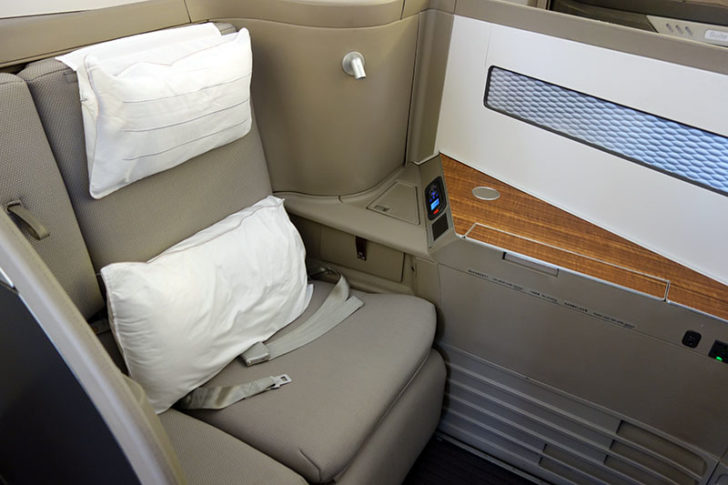I would normally preface this as a rumor, but a customer service rep on Twitter last night seemed to confirm what others have already said: Alaska Airlines is banning award redemptions on Cathay Pacific and Japan Airlines within 72 hours of departure time. This is incredibly bad news for those who aim to maximize their award redemptions, especially for travel in first class.
UPDATE: As Rocky noted, Alaska has partially reversed this move. Only intra-Asia flights on Cathay Pacific, Japan Airlines, and Hainan Airlines will be subject to the 72-hour advance booking requirement. Trans-Pacific flights will be exempt. This is good news, as the long-haul international awards are more difficult to secure and more important to customer experience.

The official line is that this has to do with preventing fraud. It’s plausible that giving the airline more time between booking and departure will allow it to detect and cancel fraudulently booked tickets, whether because the miles were stolen or sold through mileage brokers. However, it’s still an unfriendly policy for most customers.
https://twitter.com/ctravlr/status/963494346912944128
Delta instituted a blanket ban on award travel booked within 72 hours of departure a few years ago. I mis-remembered the details. In fact, Delta bans the cancellation of awards within 72 hours of departure, but this has a similar effect as banning new awards, since it makes it impossible to lock in an economy or business class award and then change to something better. That did more than anything else to damage the carrier’s reputation in my mind–more, even, than unpublishing its award redemption chart.
Isn’t there a better path? I can understand caution when travel is booked for someone other than the account holder. But if I’m booking travel for myself and my wife with our own miles, that seems pretty above board. How could there be fraud?
Why the 72 Hour Window Matters
A few airlines do release a couple seats in advance on a regular basis, but in general these programs are designed to do one thing: give away seats that would have gone unsold anyway. As you get closer to departure it is much easier to predict which flights will have unsold seats, and thus award travel becomes easier to book. Last-minute bookings are the hidden secret to getting the best award tickets.
This is especially true for Cathay Pacific. Good luck booking these flights a month or more in advance. About one or two weeks before departure is when business class becomes available with some reliability. First class may not be until one to three days before departure. I have gone so far as to book hotels and schedule time off from work, knowing that a first class seat on Cathay Pacific would become available in those final hours.
I am less worried about JAL. Despite some highlights the overall JAL product is merely above average. But Cathay Pacific is one of my favorites. I’ll go out of my way to fly with them, and at just 70,000 miles one-way, it’s one of the best bargains on the Alaska Airlines award chart.

(The original tweet by @CTravlr mentioned Hainan Airlines, too, but the Alaska rep confirmed only JAL and Cathay Pacific. There is a separate footnote on the website that mentions 72 hours for Hainan, so it may have been an old rule. Frankly, it matters less as I don’t consider it an aspirational product.)
The most offensive thing is that Alaska hasn’t even formally published this requirement on its website, instead forcing us customers to figure it out on our own. I haven’t written it off, but as phantom award space continues to plague other Alaska partners, it is becoming more difficult to take the Mileage Plan program seriously.
What to Do?
In the future, I’ll be taking a closer look at how often award space becomes available, looking for patterns at different airports with the knowledge I might need to book four or five days in advance instead of just one or two. I’ve previously written about where Cathay Pacific flies in North America, although that schedule is a bit out of date (and Washington-Dulles has been added as a new destination).
The main problem is that Cathay Pacific has discontinued the Boeing 747 and replaced many flights with the Boeing 777, which has fewer first class seats. That only makes it even harder to get an award ticket.

I could also book travel on Cathay Pacific using miles from American Airlines, British Airways, or Cathay’s own Asia Miles program. British Airways and Asia Miles are both partners with AmEx Membership Rewards. BA is also a partner with Chase Ultimate Rewards (although I wouldn’t transfer Ultimate Rewards to BA).
Here again, American Airlines is a less than ideal choice because it charges so much more for the same award award, at 110,000 miles one-way. These and other prices can be found using the Award Maximizer tool I built.
British Airways, though normally a bad choice for international premium class travel, works well here as long as you adjust your plans. From Vancouver, non-stop travel to Hong Kong is 120,000 Avios one-way in first class with very limited fuel surcharges. (From Los Angeles, it would be 200,000 Avios.) British Airways requires that you book travel at least 24 hours before departure, but this is tolerable. Alaska’s new 72-hour policy is bollocks.
Finally, Asia Miles has reasonable pricing in the range of 90,000 to 105,000 miles each way, as well as further discounts if you book a companion award (only available when one passenger is paying regular fare). I would probably go through Asia Miles and transfer Membership Rewards.
